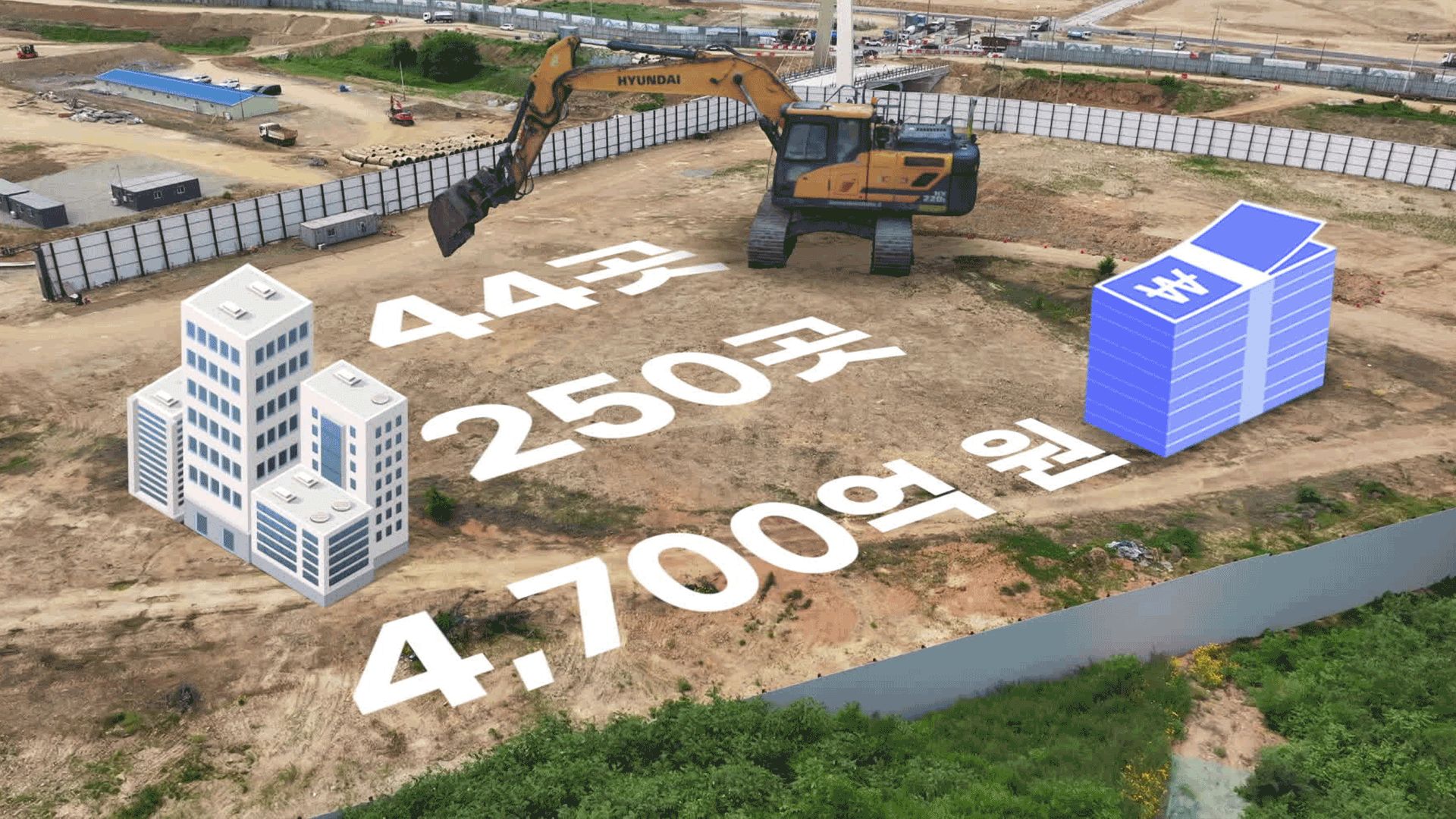[Anchor]
We turn now to the frontlines of everyday economic hardship.
With the construction industry in recession, mid-sized construction firms are collapsing one after another. Investment has stalled, and jobs are vanishing.
Many workers are now spending more days unemployed than working.
Reporter Lee Se-jung has the story.
[Report]
This is an apartment construction site.
It was scheduled to start construction in January, but it is just empty.
The construction company, Shindonga Construction, has gone bankrupt, and the first shovel has yet to be turned.
So far this year, more than 10 mid-sized construction companies have applied for court receivership.
When looking at just Shindonga, they manage 44 sites and have 250 subcontractors. The total contract amount reaches 470 billion won.
When a construction company collapses and the construction site comes to a halt, both subcontractors and workers inevitably suffer the consequences.
Seo Jong-geun, who works on apartment flooring, has already been off for four months this year.
[Seo Jong-geun/Flooring Worker: "In my 23 years doing this job, this year’s been the worst in terms of lack of work."]
He has only worked for a month recently, but he hasn't received a third of his wages.
He can't even ask about it.
[Seo Jong-geun/Flooring Worker: "Because of job security. If I speak up, I won’t get called to the next site. There’s no work, so I have no choice but to silently endure it."]
This 15-ton dump truck, which carries dirt to the construction site, has been at the garage every day this month except for one day.
With monthly payments and insurance costing about 1.6 million won, after paying for fuel with his daily wages, he is currently in the negative.
[Mr. Kim/Truck Driver: "I think it's the worst situation. I'm using up my savings, and if it doesn't work out, I have to take out loans."]
He wants to find other day labor jobs, but he can't do anything because he doesn't know when work will come in.
[Mr. Kim/Truck Driver: "If they say, 'Work tomorrow,' then I have to go out and work, and if it stops, I have to rest again, so it's that kind of situation..."]
The number of people employed in the construction industry has decreased for 13 consecutive months since May of last year, marking the longest decline on record.
The problem lies ahead.
As of April this year, both housing permits and construction starts have decreased, indicating that job growth will be difficult for the time being.
The Bank of Korea has projected this year's construction investment growth rate to be -6.1%.
This is the lowest level since the Asian financial crisis.
This is KBS News, Lee Se-jung.
We turn now to the frontlines of everyday economic hardship.
With the construction industry in recession, mid-sized construction firms are collapsing one after another. Investment has stalled, and jobs are vanishing.
Many workers are now spending more days unemployed than working.
Reporter Lee Se-jung has the story.
[Report]
This is an apartment construction site.
It was scheduled to start construction in January, but it is just empty.
The construction company, Shindonga Construction, has gone bankrupt, and the first shovel has yet to be turned.
So far this year, more than 10 mid-sized construction companies have applied for court receivership.
When looking at just Shindonga, they manage 44 sites and have 250 subcontractors. The total contract amount reaches 470 billion won.
When a construction company collapses and the construction site comes to a halt, both subcontractors and workers inevitably suffer the consequences.
Seo Jong-geun, who works on apartment flooring, has already been off for four months this year.
[Seo Jong-geun/Flooring Worker: "In my 23 years doing this job, this year’s been the worst in terms of lack of work."]
He has only worked for a month recently, but he hasn't received a third of his wages.
He can't even ask about it.
[Seo Jong-geun/Flooring Worker: "Because of job security. If I speak up, I won’t get called to the next site. There’s no work, so I have no choice but to silently endure it."]
This 15-ton dump truck, which carries dirt to the construction site, has been at the garage every day this month except for one day.
With monthly payments and insurance costing about 1.6 million won, after paying for fuel with his daily wages, he is currently in the negative.
[Mr. Kim/Truck Driver: "I think it's the worst situation. I'm using up my savings, and if it doesn't work out, I have to take out loans."]
He wants to find other day labor jobs, but he can't do anything because he doesn't know when work will come in.
[Mr. Kim/Truck Driver: "If they say, 'Work tomorrow,' then I have to go out and work, and if it stops, I have to rest again, so it's that kind of situation..."]
The number of people employed in the construction industry has decreased for 13 consecutive months since May of last year, marking the longest decline on record.
The problem lies ahead.
As of April this year, both housing permits and construction starts have decreased, indicating that job growth will be difficult for the time being.
The Bank of Korea has projected this year's construction investment growth rate to be -6.1%.
This is the lowest level since the Asian financial crisis.
This is KBS News, Lee Se-jung.
■ 제보하기
▷ 카카오톡 : 'KBS제보' 검색, 채널 추가
▷ 전화 : 02-781-1234, 4444
▷ 이메일 : kbs1234@kbs.co.kr
▷ 유튜브, 네이버, 카카오에서도 KBS뉴스를 구독해주세요!
- Construction slump leads to crisis
-
- 입력 2025-06-18 00:22:38

[Anchor]
We turn now to the frontlines of everyday economic hardship.
With the construction industry in recession, mid-sized construction firms are collapsing one after another. Investment has stalled, and jobs are vanishing.
Many workers are now spending more days unemployed than working.
Reporter Lee Se-jung has the story.
[Report]
This is an apartment construction site.
It was scheduled to start construction in January, but it is just empty.
The construction company, Shindonga Construction, has gone bankrupt, and the first shovel has yet to be turned.
So far this year, more than 10 mid-sized construction companies have applied for court receivership.
When looking at just Shindonga, they manage 44 sites and have 250 subcontractors. The total contract amount reaches 470 billion won.
When a construction company collapses and the construction site comes to a halt, both subcontractors and workers inevitably suffer the consequences.
Seo Jong-geun, who works on apartment flooring, has already been off for four months this year.
[Seo Jong-geun/Flooring Worker: "In my 23 years doing this job, this year’s been the worst in terms of lack of work."]
He has only worked for a month recently, but he hasn't received a third of his wages.
He can't even ask about it.
[Seo Jong-geun/Flooring Worker: "Because of job security. If I speak up, I won’t get called to the next site. There’s no work, so I have no choice but to silently endure it."]
This 15-ton dump truck, which carries dirt to the construction site, has been at the garage every day this month except for one day.
With monthly payments and insurance costing about 1.6 million won, after paying for fuel with his daily wages, he is currently in the negative.
[Mr. Kim/Truck Driver: "I think it's the worst situation. I'm using up my savings, and if it doesn't work out, I have to take out loans."]
He wants to find other day labor jobs, but he can't do anything because he doesn't know when work will come in.
[Mr. Kim/Truck Driver: "If they say, 'Work tomorrow,' then I have to go out and work, and if it stops, I have to rest again, so it's that kind of situation..."]
The number of people employed in the construction industry has decreased for 13 consecutive months since May of last year, marking the longest decline on record.
The problem lies ahead.
As of April this year, both housing permits and construction starts have decreased, indicating that job growth will be difficult for the time being.
The Bank of Korea has projected this year's construction investment growth rate to be -6.1%.
This is the lowest level since the Asian financial crisis.
This is KBS News, Lee Se-jung.
We turn now to the frontlines of everyday economic hardship.
With the construction industry in recession, mid-sized construction firms are collapsing one after another. Investment has stalled, and jobs are vanishing.
Many workers are now spending more days unemployed than working.
Reporter Lee Se-jung has the story.
[Report]
This is an apartment construction site.
It was scheduled to start construction in January, but it is just empty.
The construction company, Shindonga Construction, has gone bankrupt, and the first shovel has yet to be turned.
So far this year, more than 10 mid-sized construction companies have applied for court receivership.
When looking at just Shindonga, they manage 44 sites and have 250 subcontractors. The total contract amount reaches 470 billion won.
When a construction company collapses and the construction site comes to a halt, both subcontractors and workers inevitably suffer the consequences.
Seo Jong-geun, who works on apartment flooring, has already been off for four months this year.
[Seo Jong-geun/Flooring Worker: "In my 23 years doing this job, this year’s been the worst in terms of lack of work."]
He has only worked for a month recently, but he hasn't received a third of his wages.
He can't even ask about it.
[Seo Jong-geun/Flooring Worker: "Because of job security. If I speak up, I won’t get called to the next site. There’s no work, so I have no choice but to silently endure it."]
This 15-ton dump truck, which carries dirt to the construction site, has been at the garage every day this month except for one day.
With monthly payments and insurance costing about 1.6 million won, after paying for fuel with his daily wages, he is currently in the negative.
[Mr. Kim/Truck Driver: "I think it's the worst situation. I'm using up my savings, and if it doesn't work out, I have to take out loans."]
He wants to find other day labor jobs, but he can't do anything because he doesn't know when work will come in.
[Mr. Kim/Truck Driver: "If they say, 'Work tomorrow,' then I have to go out and work, and if it stops, I have to rest again, so it's that kind of situation..."]
The number of people employed in the construction industry has decreased for 13 consecutive months since May of last year, marking the longest decline on record.
The problem lies ahead.
As of April this year, both housing permits and construction starts have decreased, indicating that job growth will be difficult for the time being.
The Bank of Korea has projected this year's construction investment growth rate to be -6.1%.
This is the lowest level since the Asian financial crisis.
This is KBS News, Lee Se-jung.
-
-

이세중 기자 center@kbs.co.kr
이세중 기자의 기사 모음
-
이 기사가 좋으셨다면
-
좋아요
0
-
응원해요
0
-
후속 원해요
0















이 기사에 대한 의견을 남겨주세요.